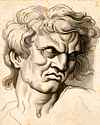 (source)
(source)
|
Marcello Malpighi
(10 Mar 1628 - 30 Nov 1694)
Italian physician, physiologist and biologist who founded the science of microscopic anatomy of such organs as the lung, kidney, brain aand skin at the microscopic level. He extended William Harvey's work on the circulation of blood.
|
Marcello Malpighi
“I but see myself exalted by my own enemies”
Illustrated Quote - Medium (500 x 250 px)
“In such sad circumstances I but see myself exalted by my own enemies, for in order to defeat some small works of mine they try to make the whole rational medicine and anatomy fall, as if I were myself these noble disciplines.”
— Marcello Malpighi
Letter to Marescotti about the dispute with Sbaraglia and others (1689?)
More Marcello Malpighi quotes on science >>
See also:
- Science Quotes by Marcello Malpighi.
- 10 Mar - short biography, births, deaths and events on date of Malpighi's birth.
- Marcello Malpighi - context of quote “Nature deserves praise…for making machines so small” - Medium image (500 x 250 px)
- Marcello Malpighi - context of quote “Nature deserves praise…for making machines so small” - Large image (800 x 400 px)
- Marcello Malpighi - context of quote “I but see myself exalted by my own enemies” - Large image (800 x 400 px)
- Marcello Malpighi - context of quote “Surgical knowledge depends on long practice” - Medium image (500 x 250 px)
- Marcello Malpighi - context of quote “Surgical knowledge depends on long practice” - Large image (800 x 400 px)








